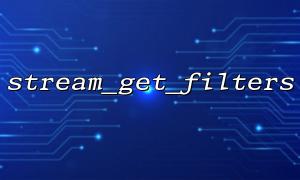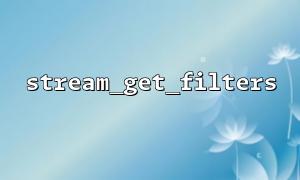In PHP, the stream_get_filters() function is used to get all registered stream filters in the current PHP environment. This function usually returns an array containing the names of all available stream filters. However, sometimes we have the problem of stream_get_filters() returning an empty array. This article will analyze in detail the common causes of this problem and provide some effective troubleshooting methods.
The flow filter in PHP may not be properly installed due to configuration issues. In the PHP configuration file ( php.ini ), support for stream filters may not be enabled.
Check the PHP configuration file to make sure that stream filter-related extensions (such as filter ) are enabled.
Check whether there is any information about the flow filter through the phpinfo() function. If there is no relevant information, it means that the flow filter extension may not be properly installed or enabled.
If there are certain problems with your PHP environment (such as the configuration file is not loaded correctly, the version is too low, etc.), it may also cause stream_get_filters() to return an empty array.
Check the PHP version to make sure that the stream filter is being used (PHP 5.2 and above).
Check that PHP loads all necessary extensions correctly, especially filter extensions.
When you use custom stream processing methods (such as custom protocols) in your code, it may affect the return result of stream_get_filters() , causing it to not recognize some stream filters.
Check whether custom streaming or custom protocols are used in the code.
If so, try to disable or modify the relevant code and see if stream_get_filters() returns the correct result.
If your code involves URL streaming operations and the URL's domain name is not a standard, PHP-backed protocol, it may cause the stream filter to not load correctly.
For example, when using the following code:
$context = stream_context_create();
$stream = fopen('http://gitbox.net/somefile.txt', 'r', false, $context);
$filters = stream_get_filters();
print_r($filters);
If PHP does not have corresponding stream filter support for the URL's protocols (such as http or gitbox.net ), stream_get_filters() may return an empty array.
Check that the protocol in your URL is correct and confirm that the protocol supports stream filters.
If it is a custom protocol, check whether the corresponding flow filter has been registered correctly.
Make sure your PHP configuration correctly loads all required extensions, especially those related to stream filters. You can check and fix it in the following ways:
Check the php.ini file to make sure that the relevant extensions are not disabled.
Restart the web server to ensure that the configuration file takes effect.
Make sure your PHP version is new enough, at least PHP 5.2 or higher. If the version is too low, consider upgrading PHP.
If possible, try to avoid using custom streaming protocols or domain names. Try to use the protocols supported by PHP (such as http , ftp , etc.) to ensure that the flow filter can be loaded and used normally.
If you do need to use a custom protocol or stream filter, you can register your own stream filter via the stream_filter_register() function. For example:
stream_filter_register('myfilter', 'my_filter_function');
$filters = stream_get_filters();
print_r($filters);
This ensures that custom filters can be correctly identified and applied.















